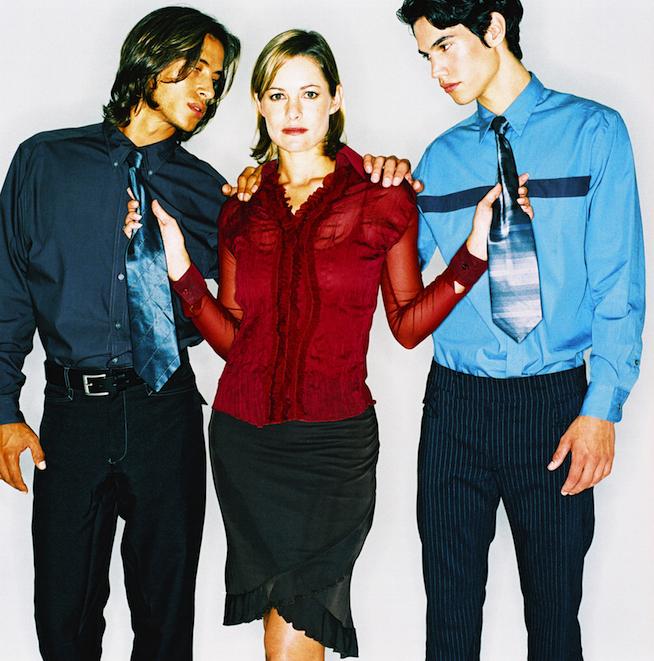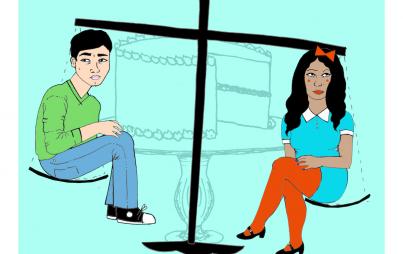
Unsure what makes it an emotional affair? These six warning signs provide a good idea of what to avoid.
In at least one of my romantic relationships, I fell into the trap of engaging in affairs. The problem (aside from one extremely dumb incident of physical cheating I much regret), was not touching someone else’s skin. The issue I found emerging was allowing someone else to touch my heart. One truth that’s not so self-evident is that not all affairs are created equal. In fact, I find I can draw clear lines between affairs of the heart and those of the flesh. They can be separate, they can be one in the same, but they are both equally damning.
I often struggle with the idea of commitment and to a point, I never understood the concept of monogamy. In fact, sometimes I still don’t. The idea of commitment and settling down with one person — forever, or even for a long, long time — scares me. Permanency, aside from my tattoos, is much lacking across most of my life — from where I’ve lived to the relationships I’ve been in—and out of. But despite my hesitation to embrace commitment on an intellectual level, I know first-hand how dreadful affairs can be, because I have been both betrayer and betrayed.
We know what a physical affair is, making it easy to identify when someone is “cheating.” In most monogamous relationships, displays of physical affection or sexual relations with someone other than your partner are proof that you’re having an an affair. The standard can vary depending on the couple, but affectionate physical and any type of sexual contact with anyone other than your partner gets labeled as cheating.
But what about emotional affection and emotional intimacy? This is where it becomes more difficult and often confusing. Emotional attachments are murky and gray and are not as clear cut as one single action. When considering emotional affairs, I know I am not covering all the behaviors, but these are the six main warning signs I saw in my experience on both sides of the equation.
1. Looking to someone else for attention & validation
If you are in a relationship, you shouldn’t need or want another person to validate your emotional needs at an intimate level. The keyword there is intimate. I love my friends, and I have great friends of both sexes, but the support they provide for me is different than the support my partner provides. Even when interacting with my female friends, these connections are not crossing the line of validation or providing me the attention I should be receiving from my partner.
If you are in a relationship, you shouldn’t need to turn to someone besides your partner, especially someone attractive to you, as a means of feeling validation. You shouldn’t need to feel beautiful/important/significant only because someone else tells you that you are. Even if your relationship is struggling, this isn’t a sign to begin finding attention elsewhere. It is a sign of needing to fix things instead of opening up to others or a sign to move on. Lacking emotional validation in your current relationship is not an excuse to find it elsewhere. Relying on another for the validation your partner once gave you is a slippery spiral.
2. Hiding relationships from your partner
I do not believe couples should share all their communications with each other. I don’t believe in reading your SO’s text, emails, or messages. But, there should be lines of respect. If you have to hide your interactions with another because of what you are saying or doing during these interactions, that is when it crosses the line into the murky area. If you have to hide from your partner the conversation you are having with another, whether it be deleting conversations for fear your partner would see them or hiding an entire period of hanging out, you may be having — or at least verging on — an emotional affair.
I understand the need for privacy, and sometimes we say things to our friends in frustration or question our relationships. But even when we vent, we should be venting things we are willing, though perhaps reluctant, to say to our partner. If you have to hide your interactions with another, you have one of two reasons. Either your relationship with your partner is unhealthy, or your relationship with the other person is unhealthy. I’m not saying you need to know everything your partner is saying or vice versa, but you shouldn’t need to hide the interactions you are having with another.
3. Inappropriate correspondence
In emotional affairs, our words and hearts are where we see lines being crossed. For warnings, pay attention to your language with another potential romantic or relationship interest. For emotional affairs, I would challenge the following types of correspondence:
- Flirting
- Talking about missing someone on an intimate level
- Romanticizing ideas of what a relationship could look like
- Sharing information about your current relationship your partner would not want you to share (example talking about sexual frustrations)
- Constantly tearing down your partner to another
In situations of romantic affairs, it can certainly extend past these basic lines of communication, but these are a first of the few big dangerous conversations you would want to avoid having. As with many other aspects, it comes down to the idea of what type of interactions are you having with someone and would you be willing to have these interactions in front of your current partner?
4. Rekindling old romantic relationship
Rekindling past relationships is a huge no, and one that extends across a few of the other taboos. I do not believe it is bad to have a friendship with an ex. But you should be careful what this friendship resembles. If you start to cross the lines of relying on your ex for emotional intimacy, or if you start treating them like a partner again, these behaviors are not fair to your current partner. When you rely on someone you used to be intimate with — whether physically or emotionally — for support, it is a sign you are cheating on an emotional level.
5. Having feelings for someone
If you find yourself admitting you have feelings for someone, chances are you’re in serious danger of crossing the line into an emotional affair. And if you are pursuing a chance at those feelings, you’ve crossed it. We cannot help that sometimes we find other people attractive. In life, we feel draws to many people aside from our partners. This is normal. The question is this: how do we act on those feelings?
There is a difference between feeling you are connected to someone on a deeper level and letting this connection develop. Think of it this way: in the world of romance we are like ships at sea. You are going to see many lighthouses, but in monogamy, you only rely on one to guide you. If you start relying on multiple lighthouses, you are going to find yourself torn. It isn’t noticing someone else might be emotionally compatible. It is starting to make yourself open to this person. It is okay to see the spark, but don’t chase that flame.
6. Reciprocation
In all of these situations, there is a degree of reciprocation. You cannot control what another person is doing. If someone is constantly flirting with you or attempting to bring up a relationship with you, this is one thing. The real danger arises when you reciprocate.
If someone were to kiss you without your permission, that is a form of assault. If someone is going to make emotional advances on you, let’s say an ex who is pining away or a person you were friendly with but with whom you don’t feel a connection, that is not an affair. An affair features both reciprocation and repetition. It is when you start to show these feelings of attention back, when you start to encourage and welcome them, and most of all when you initiate them, that the emotional affair erupts into full bloom.
The litmus test
Here is my litmus test for whether or not you are engaging in an emotional affair. For me, it is a simple way of how I determine what my interactions should look like when I am in a romantic relationship, and I am building interpersonal relationships with others.
Would I be comfortable engaging in this behavior if my partner were watching?
It is that simple. If my partner were next to me, would I feel comfortable saying the things I were saying? Would I be comfortable with them knowing what I was talking about? Would I be comfortable with them watching my interaction with another person?
Emotional affairs extend beyond simple friendship. They reach the point where you know you would be uncomfortable doing this behavior in front of a partner or if they were doing this wit another person.
Harboring feelings about your partner and not telling them is a dangerous thing. From frustrations to complaints, you should be willing to talk to your partner. It is not always the prettiest, but it does help you grow. The best relationships I know are the open ones. When we start hiding our relationships with others from our partners, especially with people we begin forming an emotional connection to, we are crossing into the gray area of an emotional affair. If you give someone the privilege of touching your heart, you should be careful about opening that door to others. Just take a moment, and think about whether you’d like your partner to open that door to someone other than you.
Originally appeared at The Good Men Project. Get the best of The Good Men Project delivered daily or weekly, or become a Premium Member!







